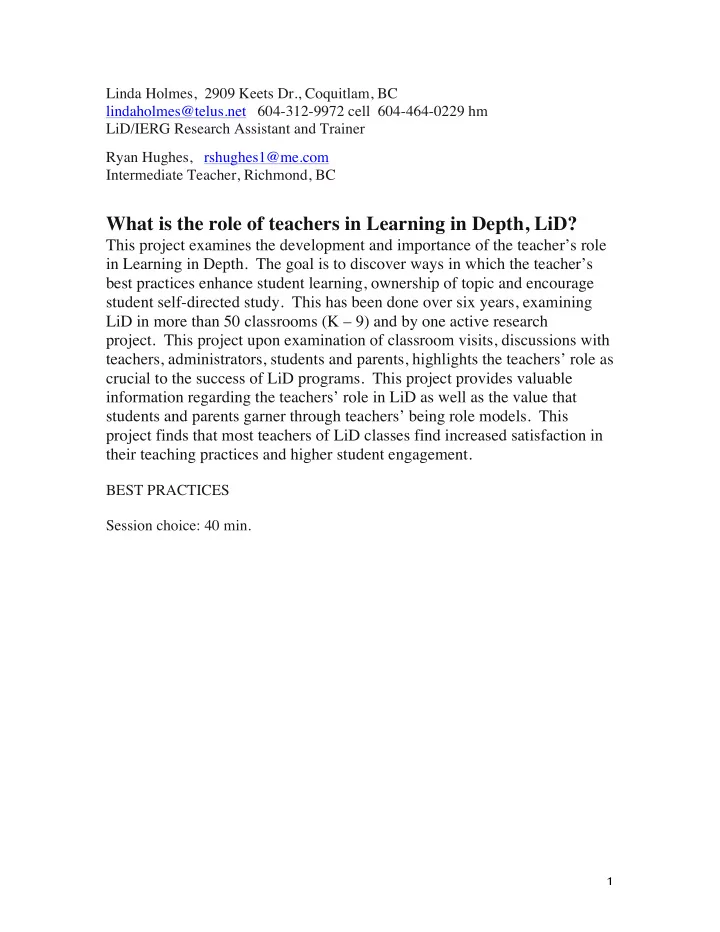

Linda Holmes, 2909 Keets Dr., Coquitlam, BC lindaholmes@telus.net 604-312-9972 cell 604-464-0229 hm LiD/IERG Research Assistant and Trainer Ryan Hughes, rshughes1@me.com Intermediate Teacher, Richmond, BC What is the role of teachers in Learning in Depth, LiD? ¡ This project examines the development and importance of the teacher’s role in Learning in Depth. The goal is to discover ways in which the teacher’s best practices enhance student learning, ownership of topic and encourage student self-directed study. This has been done over six years, examining LiD in more than 50 classrooms (K – 9) and by one active research project. This project upon examination of classroom visits, discussions with teachers, administrators, students and parents, highlights the teachers’ role as crucial to the success of LiD programs. This project provides valuable information regarding the teachers’ role in LiD as well as the value that students and parents garner through teachers’ being role models. This project finds that most teachers of LiD classes find increased satisfaction in their teaching practices and higher student engagement. BEST PRACTICES Session choice: 40 min. ¡ ¡ ¡ ¡ ¡ ¡ ¡ ¡ ¡ ¡ ¡ ¡ ¡ ¡ ¡ ¡ ¡ ¡ 1 ¡
The ¡Role ¡of ¡Teachers ¡in ¡Learning ¡in ¡Depth ¡ By ¡Linda ¡Holmes ¡ ¡ “It ¡is ¡the ¡supreme ¡art ¡of ¡the ¡teacher ¡to ¡awaken ¡joy ¡in ¡creative ¡expression ¡and ¡ knowledge.” ¡ ¡Albert ¡Einstein ¡ ¡ ¡ ¡ ¡ ¡ ¡ ¡ ¡ ¡ ¡ ¡I ¡hope ¡this ¡paper ¡will ¡accomplish ¡two ¡things, ¡a ¡deeper ¡understanding ¡of ¡ Learning ¡in ¡Depth ¡(LiD) ¡and ¡the ¡role ¡we ¡adults ¡play ¡in ¡it. ¡ ¡And ¡if ¡by ¡sharing ¡LiD ¡ experiences ¡the ¡life ¡of ¡educators ¡is ¡eased ¡and ¡benefited, ¡then ¡the ¡journey ¡will ¡be ¡ totally ¡worthwhile. ¡ ¡ ¡ ¡ ¡ ¡ ¡ ¡ ¡ ¡ ¡ ¡And ¡before ¡I ¡start ¡sharing ¡the ¡LiD ¡experiences, ¡I ¡believe ¡it ¡is ¡imperative ¡to ¡ understand ¡the ¡basic ¡core ¡principles ¡of ¡the ¡LiD ¡program, ¡as ¡these ¡directly ¡affect ¡the ¡ function ¡of ¡LiD ¡and ¡teachers, ¡in ¡ways ¡that ¡may ¡seem ¡counter-‑intuitive ¡to ¡the ¡manner ¡ most ¡programs ¡in ¡schools ¡are ¡managed. ¡ ¡ ¡ Core ¡principles ¡of ¡LiD ¡are: ¡ • Teachers ¡create ¡a ¡portfolio ¡and ¡or ¡artifacts ¡box ¡for ¡each ¡student ¡ ¡ • LiD ¡is ¡an ¡add-‑on ¡program ¡of ¡approximately ¡one ¡hour ¡a ¡week ¡ • Each ¡student ¡will ¡receive ¡one ¡topic ¡for ¡their ¡school ¡career ¡ • LiD ¡is ¡a ¡long-‑term ¡project. ¡ ¡The ¡results ¡are ¡realized ¡over ¡time. ¡ • All ¡topics ¡meet ¡a ¡set ¡criteria ¡that ¡allows ¡for ¡the ¡depth ¡and ¡breadth ¡of ¡study ¡ • In ¡the ¡beginning ¡each ¡student ¡will ¡receive ¡a ¡topic ¡that ¡is ¡randomly ¡picked ¡ • LiD ¡is ¡not ¡taught, ¡marked ¡or ¡graded ¡ • It ¡is ¡up ¡to ¡the ¡student ¡to ¡‘drive’ ¡their ¡topic ¡and ¡they ¡are ¡responsible ¡for ¡their ¡ time ¡and ¡work ¡ ¡ ¡ ¡ 2 ¡
¡ “Experience ¡is ¡a ¡hard ¡teacher ¡because ¡she ¡gives ¡the ¡test ¡first, ¡the ¡lesson ¡ afterward.” ¡ ¡Vernon ¡Law ¡ ¡ ¡ ¡ ¡ ¡ ¡ ¡ ¡ ¡ ¡When ¡I ¡first ¡started ¡LiD ¡in ¡2008 ¡there ¡wasn’t ¡a ¡LiD ¡book ¡yet. ¡ ¡I ¡had ¡heard ¡Dr. ¡ Egan ¡talk ¡about ¡LiD ¡and ¡I ¡was ¡intrigued, ¡so ¡much ¡so, ¡that ¡using ¡just ¡the ¡principals ¡ written ¡above, ¡I ¡created ¡what ¡I ¡thought ¡a ¡functioning ¡LiD ¡program ¡would ¡look ¡like. ¡ Through ¡weeks ¡of ¡planning, ¡organizing ¡and ¡enrolling ¡staff ¡and ¡administration ¡I ¡ enthusiastically ¡implemented ¡LiD ¡into ¡my ¡early ¡primary, ¡multi-‑aged ¡class. ¡ ¡ ¡ ¡ I ¡discovered ¡in ¡the ¡first ¡month ¡that ¡LiD ¡was ¡a ¡lot ¡of ¡work! ¡The ¡preparation ¡of ¡ materials ¡(portfolios, ¡magazines, ¡books, ¡etc.) ¡for ¡LiD ¡was ¡time ¡consuming ¡but ¡ nothing ¡too ¡onerous. ¡ ¡I ¡was ¡overwhelmed ¡by ¡the ¡huge ¡demand ¡of ¡my ¡students ¡for ¡ my ¡time. ¡ ¡They ¡struggled ¡with ¡being ¡independent, ¡self-‑directed ¡and ¡patient. ¡ ¡The ¡ students ¡looked ¡to ¡me ¡to ¡tell ¡them ¡what ¡to ¡do. ¡ ¡I ¡found ¡my ¡LiD ¡classes ¡chaotic, ¡loud, ¡ unfocussed ¡and ¡more ¡importantly, ¡I ¡seemed ¡to ¡be ¡doing ¡most ¡of ¡the ¡work! ¡ ¡LiD ¡was ¡ exhausting ¡and ¡frustrating ¡because, ¡as ¡soon ¡as ¡I ¡helped ¡one ¡student, ¡three ¡more ¡ appeared. ¡I ¡was ¡enthusiastically ¡excited ¡about ¡teaching ¡my ¡students ¡to ¡build ¡a ¡ relationship ¡with ¡knowledge, ¡only ¡to ¡find ¡out ¡they ¡were ¡dependent ¡on ¡me. ¡ ¡Was ¡it ¡ lack ¡of ¡skills, ¡tools, ¡understanding ¡or ¡teacher ¡support? ¡ ¡So, ¡I ¡enrolled ¡the ¡Librarian ¡to ¡ join ¡us ¡during ¡LiD ¡to ¡be ¡an ¡extra ¡pair ¡of ¡helping ¡hands. ¡ ¡She ¡was ¡a ¡great ¡help ¡and ¡it ¡ soon ¡became ¡obvious ¡that, ¡ ¡although ¡the ¡children, ¡received ¡help ¡quicker ¡and ¡the ¡ behavior ¡issues ¡mellowed, ¡they ¡still ¡remained ¡dependent ¡on ¡a ¡lot ¡of ¡teacher ¡time. ¡ ¡ ¡ I ¡was ¡at ¡a ¡crossroad. ¡ ¡Why ¡weren’t ¡my ¡students ¡more ¡independent ¡and ¡self-‑ directed? ¡ ¡How ¡do ¡I ¡get ¡my ¡students ¡to ¡be ¡independent, ¡self-‑directed ¡LiD ¡people? ¡ ¡ 3 ¡
Recommend
More recommend